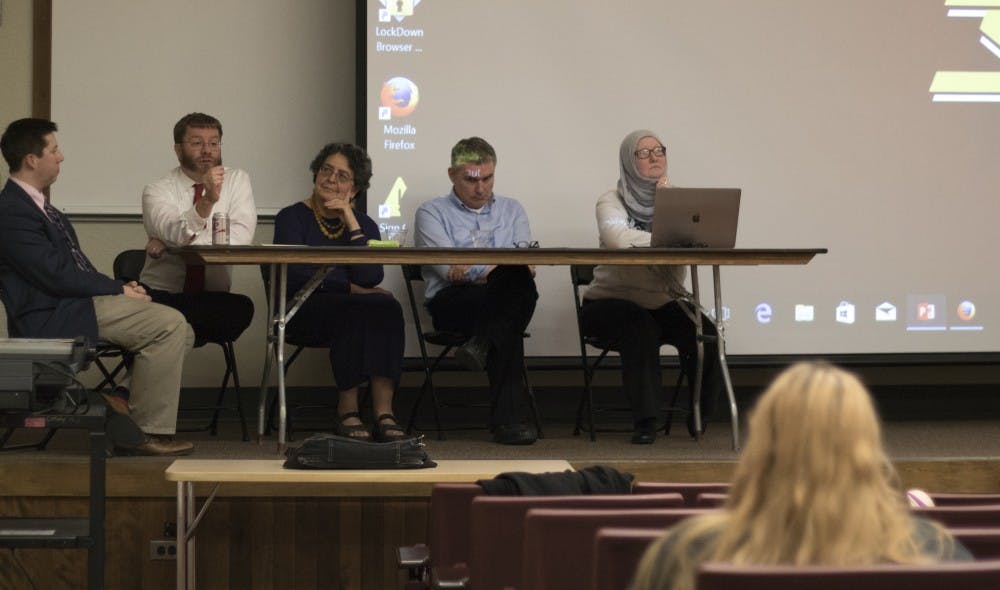Boundaries, Borders and Migration panel discusses gender, feminism

Five faculty and staff members served as panelists for a discussion about women and gender on Oct. 17 in Anspach Hall. Each panelist provided information related to their field of study, all of which tied into the theme of the discussion: boundaries, borders and migration.
The panel discussion was part of a series titled “Critical Engagements: Questions that matter.” The series is sponsored by the College of Humanities and Social and Behavioral Sciences.
The panel included a set of speakers including men, women, and non-binary individuals.
The first panelist to speak was Jon Humiston, special assistant to the provost. Humiston’s dissertation was about the experience of transgender and non-binary college students. Specifically, how campus climate affects transgender and non-binary students.
“Those who transgress the gender binary, are mistreated in many ways," Humiston said. "They are mistreated by their families. They’re mistreated by public services. They’re mistreated at school and at work.”
Humiston explained the importance of making college campuses inclusive for students who don’t fit within gender norms. According to Humiston, a college degree decreases the likelihood of transgender and nonbinary adults living in poverty or suffering from drug and alcohol addiction.
Panelist Ulana Klymyshyn, Emeritus in Inclusion and Diversity, focused on talking about assimilation, which is adapting to fit a new culture. She explained she grew up in a tight-knit Ukrainian community in the U.S. As a child, she said, she rarely had to interact with Americans. The schools were Ukrainian; the businesses were Ukrainian; most of her neighbors married within the Ukrainian community.
Klymyshyn said she didn't need to speak English regularly until she enrolled at University of Michigan. After living in American culture for 20 years, she realized how different she had become from the people she grew up with. Noting many of them never left the Ukrainian community.
"Most of them married within their community (and) they raised their children to become Ukrainian,” Klymyshyn said.
Timothy O’Neil, history faculty member explored the topic of roles of Irish women in Michigan. He showed the audience census data for the city of Calumet in 1920. In the data, there was a noticeable difference between the gender roles for Irish-Americans and the gender roles for other ethnicities. According to O’Neil, Irish-American women made up one third of the Irish workforce, which was much more than other ethnic communities.
Edward Clayton, political science and public administration faculty member talked about men’s perspective of the feminist movement and offered advice for men wanting to be apart of the movement.
“You don’t have to feel guilty about the past, you just have to feel responsible for the future,” Clayton said. “We’re living in a world that was made by people with different attitudes.”
During the panel, Lisa Gandy, computer science faculty member spoke about women in technology. According to Gandy, only 28 percent of computer science degrees are earned by women and newly hired women make 29 percent less money than their male peers, even if their qualifications are the same.
While in graduate school, the “advice” she received was very negative. She called it a “laundry list” of things she needed to change about herself in order to be taken seriously in her field.
“Why is everything I do, as a woman, a problem?” she said, explaining she believes colleges and employers should be changing to be more accommodating and inclusive for women.
After all panelists gave their individual presentations, the discussion opened up for the audience to ask questions. The discussion included changing societal norms and male privilege. The "#MeToo" movement came up as well, which is a hashtag on social media recognizing women who have either been sexually harassed or assaulted.
A related event, "Take Back the Night", is a march which will take place Oct. 19th in front of Charles V. Park Library. The march is an annual protest against sexual assault and domestic violence.



